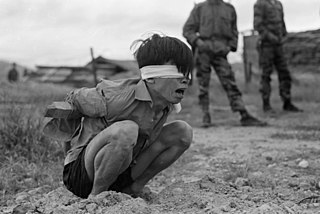
Torture is the deliberate infliction of severe pain or suffering on a person for various reasons, including punishment, extracting a confession, interrogation for information, or intimidating third parties. Some definitions are restricted to acts carried out by the state, but others include non-state organizations.
Peer support occurs when people provide knowledge, experience, emotional, social or practical help to each other. It commonly refers to an initiative consisting of trained supporters, and can take a number of forms such as peer mentoring, reflective listening, or counseling. Peer support is also used to refer to initiatives where colleagues, members of self-help organizations and others meet, in person or online, as equals to give each other connection and support on a reciprocal basis.

The International Rehabilitation Council for Torture Victims (IRCT) is an independent, international health professional organization that promotes and supports the rehabilitation of torture victims and works for the prevention of torture worldwide. Based in Denmark, the IRCT is the umbrella organization for over 160 independent torture rehabilitation organizations in 76 countries that treat and assist torture survivors and their families. They advocate for holistic rehabilitation for all victims of torture, which can include access to justice, reparations, and medical, psychological, and psycho-social counseling. The IRCT does this through strengthening the capacity of their membership, enabling an improved policy environment for torture victims, and generating and share knowledge on issues related to the rehabilitation of torture victims. Professionals at the IRCT rehabilitation centers and programs provide treatment for an estimated 100,000 survivors of torture every year. Victims receive multidisciplinary support including medical and psychological care and legal aid. The aim of the rehabilitation process is to empower torture survivors to resume as full a life as possible. In 1988, IRCT, along with founder Inge Genefke, was given the Right Livelihood Award "for helping those whose lives have been shattered by torture to regain their health and personality."
José Quiroga Fuentealba is a cardiologist who served as a physician to Chilean president Salvador Allende. During the 1973 Chilean coup d'état, Quiroga witnessed the Chilean Army assault the government palace. He was detained and beaten until his release was ordered by a Chilean military general.
Bangladesh Rehabilitation Centre for Trauma Victims is a Bangladeshi NGO, working in the area of rehabilitation of trauma victims. It was established in 1992. BRCT began its journey by providing medical treatment, legal support, and rehabilitation to the victims on 25 February 1992 with support from foreign medical experts.

The Center for Victims of Torture (CVT) is an international non-profit headquartered in Saint Paul, Minnesota, that provides direct care for those who have been tortured, trains partner organizations in the United States and around the world who can prevent and treat torture, conducts research to understand how best to heal survivors, and advocates for an end to torture.
The Norwegian Centre for Violence and Traumatic Stress Studies is a research centre in Oslo, Norway, and Norway's national research institution in violence and sexual abuse; disaster management, terrorism, armed conflicts and traumatic stress; and forced migration and refugee health research. It is interdisciplinary and employs experts mainly in psychology, psychiatry, and the social sciences. In addition to carrying out research and related activities, the institute advises the Government of Norway in its areas of expertise and has some official emergency management functions at the national level. NKVTS has 101 employees.

The Democratic Republic of the Congo, and the east of the country in particular, has been described as the "Rape Capital of the World", and the prevalence and intensity of all forms of sexual violence has been described as the worst in the world. Human Rights Watch defines sexual violence as "an act of a sexual nature by force, or by threat of force or coercion", and rape as "a form of sexual violence during which the body of a person is invaded, resulting in penetration, however slight, of any part of the body of the victim, with a sexual organ, or of the anal or genital opening of the victim with any object or other part of the body."
The Institute of Therapy and Investigation into the Effects of Torture and State Violence is a multidisciplinary non-governmental organisation based in Bolivia. It offers assistance to those affected directly or indirectly by torture and state violence through rehabilitative means.

Torture: Journal on Rehabilitation of Torture Victims and Prevention of Torture is a peer-reviewed medical journal on rehabilitation of torture victims and prevention of torture, published triannually by the International Rehabilitation Council for Torture Victims.

The Gaza Community Mental Health Programme (GCMHP) is the leading Palestinian non-governmental organization which provides mental health services to the inhabitants of the Gaza Strip. The organization's stated purpose is committed to aid women, children, and victims of violence, torture, and human rights violations. The organization has over 135 employees, is involved with 18 international, regional and local coalitions and networks, and has treated over 20,000 clients.

The Program for Torture Victims (PTV) is a non-profit organization that provides medical, psychological, case management and legal services to torture survivors. PTV serves more than 300 victims of state-sponsored torture from over 65 countries annually.

The Torture Abolition and Survivors Support Coalition International (TASSC) is a non-governmental, nonprofit organization based in the United States that works to end the practice of torture internationally and to support the survivors of torture and their families. TASSC is concerned not only with the prevention of torture but also addresses its aftermath, the individual survivor, family, community, and society. In addition to creating a worldwide network of International Communities of Healing for torture survivors and their families, TASSC also seeks to influence domestic and international policy through advocacy, social action, public testimony, and targeted media campaigns. The organization monitors human rights violations in nations where TASSC members may be at risk, operates Helping Hands, a direct assistance program for survivors, and coordinates the annual United Nations International Day in Support of Torture Victims and Survivors. TASSC was founded in 1998 by Sister Dianna Ortiz, an American survivor of torture while a missionary in Guatemala. The office of TASSC is located in Washington, D.C.
Center for Survivors of Torture (CST) is a non-profit 501(c)(3) organization founded in Dallas, Texas with an office in Austin, Texas. CST was founded in 1997 with the mission of rehabilitating international torture survivors through counseling, medical, legal, and social services.
The Inge Genefke Award is granted every second year by the Anti-Torture Support Foundation to a person who has carried out particularly outstanding work against torture. Named after Dr. Inge Genefke, a Danish physician and trailblazer in the worldwide fight against torture, the award can not be applied for, but is given by the decision of the board of the Anti-Torture Support Foundation.
Basque National Liberation Movement prisoners are all those people who have been imprisoned, placed on remand, or otherwise kept in custody due to their illegal activity in support of the Basque National Liberation Movement.

Torture in Venezuela has been a consistent phenomenon throughout its history. Various dictatorships from the Spanish colonial era into the twentieth century utilized torture against common criminals and political opponents. In the twentieth century, torture was common during the dictatorships of Juan Vicente Gómez and Marcos Pérez Jiménez. Torture also took place occasionally during Venezuela's democratic period, particularly during social outbursts, such as during the Caracazo and the 1992 coup attempts.

The Bellevue Program for Survivors of Torture (PSOT) was established in 1995 as joint project of Bellevue Hospital Center and the New York University School of Medicine to address the complex needs of torture survivors residing in the New York Metropolitan area. Since its founding, the Program continues to operate from Bellevue Hospital Center, located at 462 First Avenue CD723, New York City, NY 10016. The Program is the first and largest torture treatment center in the New York City area, providing multidisciplinary and comprehensive medical, mental health, legal, and social services to victims of torture and their families. PSOT's mission is to assist individuals subjected to torture and other human rights abuses to rebuild healthy, self-sufficient lives, and contribute to global efforts to end torture. Since its inception in 1995, PSOT has provided care to help rebuild the lives of more than 5,000 men, women, and children from over 100 countries.
The Primo Levi Center is a care center in Paris for people who are victims of torture and political violence in their country of origin and today refugees in France. These people are seen by doctors, psychologists and a physiotherapist. They can also receive the help of a social worker and a lawyer.

Pau Perez-Sales is a psychiatrist and director of the Universidad Complutense de Madrid's Post-Doctoral Degree in Mental Health in Political Violence and Catastrophe. He is also affiliated with the Department of Psychiatry Hospital La Paz in Madrid and Director of SiR[a], Centre for research, forensic documentation and rehabilitation of ill-treatment and torture victims.












